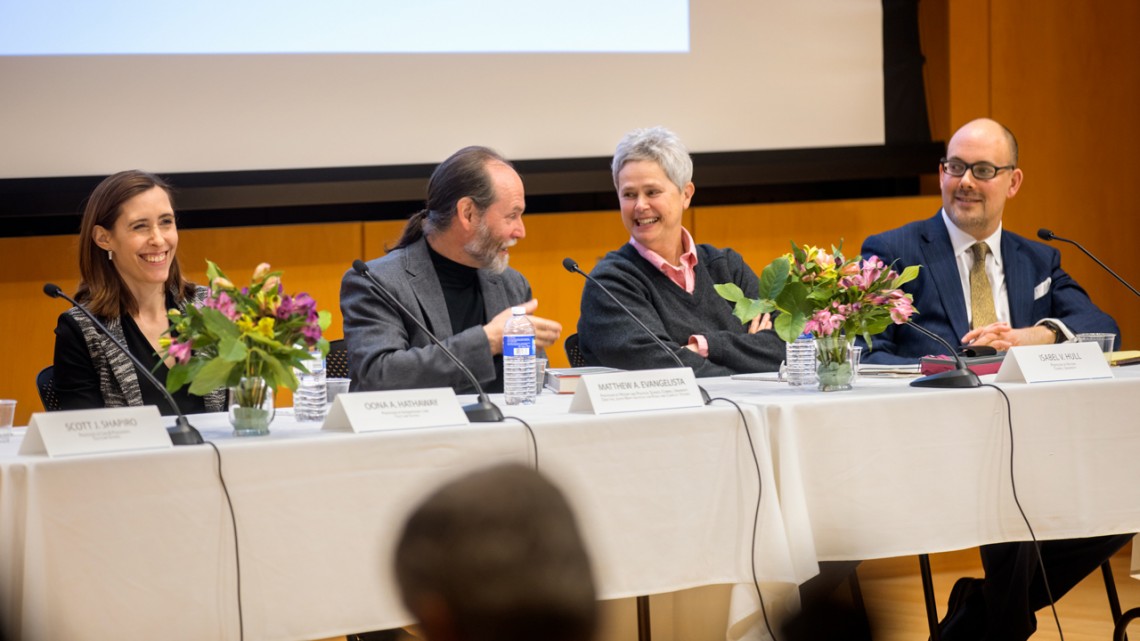
From left, Yale professor Oona Hathaway, Cornell's Matthew Evangelista, Isabel Hull and Jens David Ohlin at the Lund Critical Debate Series event held March 1.
Cornell, Yale scholars debate success of outlawing war
By Justin Welfeld
Using a 90-year-old treaty as a starting point, professors from Cornell and Yale argued over the idea that international conflicts could be prevented by law in a debate held March 1 in Klarman Hall.
Cornell professors Isabel V. Hull (history) and Jens David Ohlin (law) squared off against Yale law professors Oona A. Hathaway and Scott J. Shapiro as part of the Lund Critical Debate Series, which brings to campus speakers of prominence in international affairs who can address topical issues from a variety of perspectives.
Hathaway and Shapiro are co-authors of the 2017 book, “The Internationalists: How a Radical Plan to Outlaw War Remade the World.” In it, they argued that the 1928 Kellogg-Briand Pact, written by France and the United States and signed by all the world's powers, succeeded in flipping the global perception of the legitimacy of war as a way of resolving disputes.
Framing the debate as especially relevant now, moderator Matthew Evangelista – Cornell’s President White Professor of History and Political Science – called last June’s U.N. treaty banning nuclear weapons “paradoxical when we have leaders such as the presidents of North Korea and the United States threatening to use nuclear weapons.”
Opening the debate, Shapiro acknowledged he and his colleagues once considered Kellogg-Briand “a somewhat absurd example of diplomatic folly and dangerous idealism in international law.”
Yet, he said, his and Hathaway's research revealed that the treaty's signers “unwittingly unleashed chaos upon the international sphere,” kicking the stool out from under an old world order that regarded “war was a legitimate form of statecraft” and a basic tool of diplomacy.
During this transformative stage, Hathaway said, the “internationalists didn't fully appreciate how many rules rested on war as a mechanism for righting wrongs.” In the years following Kellogg-Briand, the international community scrambled to develop the political machinery to regulate states’ activities, rejecting the right of conquest and “gunboat diplomacy” while legalizing not only the employment of economic sanctions, but also prosecution for wartime acts of aggression.
Shapiro and Hathaway presented graphs showing a steep decline in the amount of territory seized in wars of conquest after the pact was signed, and cited this shift as evidence for the success of formally outlawing war.
In her response, Hull rejected the notion that Kellogg-Briand was the cause for these changes. Instead, she said, the decline reveals “a much longer history of curbing war involving major roles by state leaders, diplomats and military men,” beginning in the 17th century.
Ohlin also questioned the centrality of the treaty. “The argument in the book fails to give sufficient credence to the restrictions on the use of force before the pact,” he said. He argued that the adoption of the United Nations charter and creation of the U.N. security council in 1945 was a more important turning point in nations’ use of force.
Ohlin lauded the authors’ “expert job of marshalling empirical evidence to look at the cases of conquered territory,” but emphasized we now “live in a world where territory is less relevant.” The era of projecting influence by seizing territory has passed, Ohlin said. “A more relevant method to gauge whether war has been effectively outlawed would be to see the number of cases of warfare,” he said.
Addressing audience concerns of an impending nuclear war between the U.S. and North Korea, Hull explained that policy to outlaw war fails when “states develop counter-assumptions about states’ rights, which cause them to become revisionist and reject rules of international law.”
President Trump has been talking a dangerous game, Hathaway acknowledged. “A preemptive strike on North Korea is not only a terrible thing and a deeply violative act, but puts the whole international legal order at risk.”
The event was organized by the Mario Einaudi Center for International Studies and co-sponsored by the Judith Reppy Institute for Peace and Conflict Studies. The Lund Critical Debate series is funded by Judith Lund Biggs ’57.
Justin Welfeld ’20 is a writer intern for the Cornell Chronicle.
Media Contact
Get Cornell news delivered right to your inbox.
Subscribe
